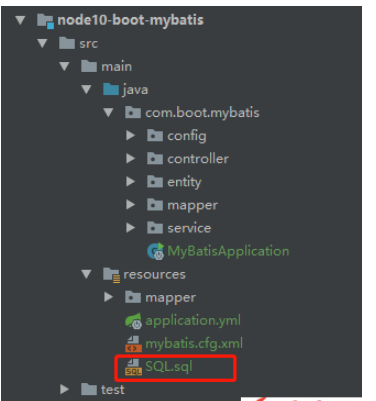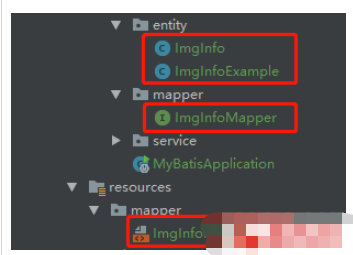How to integrate the Mybatis framework in SpringBoot2
1. Mybatis framework
1. Introduction to mybatis
MyBatis is an excellent persistence layer framework that supports customized SQL, stored procedures and advanced mapping. MyBatis avoids almost all JDBC code and manual setting of parameters and retrieval of result sets. MyBatis can use simple XML or annotations to configure and map native types, interfaces, and Java POJOs (Plain Old Java Objects, plain old Java objects) into records in the database.
2. Mybatis features
1)sql语句与代码分离,存放于xml配置文件中,方便管理 2)用逻辑标签控制动态SQL的拼接,灵活方便 3)查询的结果集与java对象自动映射 4)编写原生态SQL,接近JDBC 5)简单的持久化框架,框架不臃肿简单易学
3. Applicable scenarios
MyBatis focuses on SQL itself and is a flexible enough DAO layer solution.
MyBatis will be a good choice for projects that have high performance requirements or have changing needs.
2. Integration with SpringBoot2
1. Project structure diagram

Using druid connection pool, this connection pool.
2. Core dependencies
<!-- mybatis依赖 --> <dependency> <groupid>org.mybatis.spring.boot</groupid> <artifactid>mybatis-spring-boot-starter</artifactid> <version>1.3.2</version> </dependency> <!-- mybatis的分页插件 --> <dependency> <groupid>com.github.pagehelper</groupid> <artifactid>pagehelper</artifactid> <version>4.1.6</version> </dependency>
3. Core configuration
mybatis: # mybatis配置文件所在路径 config-location: classpath:mybatis.cfg.xml type-aliases-package: com.boot.mybatis.entity # mapper映射文件 mapper-locations: classpath:mapper/*.xml
4. Files generated by reverse engineering

I won’t post the code here.
5. Write basic test interface
// 增加 int insert(ImgInfo record); // 组合查询 List<img info alt="How to integrate the Mybatis framework in SpringBoot2" > selectByExample(ImgInfoExample example); // 修改 int updateByPrimaryKeySelective(ImgInfo record); // 删除 int deleteByPrimaryKey(Integer imgId);</imginfo>
6. Write interface implementation
@Service
public class ImgInfoServiceImpl implements ImgInfoService {
@Resource
private ImgInfoMapper imgInfoMapper ;
@Override
public int insert(ImgInfo record) {
return imgInfoMapper.insert(record);
}
@Override
public List<img info alt="How to integrate the Mybatis framework in SpringBoot2" > selectByExample(ImgInfoExample example) {
return imgInfoMapper.selectByExample(example);
}
@Override
public int updateByPrimaryKeySelective(ImgInfo record) {
return imgInfoMapper.updateByPrimaryKeySelective(record);
}
@Override
public int deleteByPrimaryKey(Integer imgId) {
return imgInfoMapper.deleteByPrimaryKey(imgId);
}
}</imginfo>7. Control layer test class
@RestController
public class ImgInfoController {
@Resource
private ImgInfoService imgInfoService ;
// 增加
@RequestMapping("/insert")
public int insert(){
ImgInfo record = new ImgInfo() ;
record.setUploadUserId("A123");
record.setImgTitle("博文图片");
record.setSystemType(1) ;
record.setImgType(2);
record.setImgUrl("https://avatars0.githubusercontent.com/u/50793885?s=460&v=4");
record.setLinkUrl("https://avatars0.githubusercontent.com/u/50793885?s=460&v=4");
record.setShowState(1);
record.setCreateDate(new Date());
record.setUpdateDate(record.getCreateDate());
record.setRemark("知了");
record.setbEnable("1");
return imgInfoService.insert(record) ;
}
// 组合查询
@RequestMapping("/selectByExample")
public List<img info alt="How to integrate the Mybatis framework in SpringBoot2" > selectByExample(){
ImgInfoExample example = new ImgInfoExample() ;
example.createCriteria().andRemarkEqualTo("知了") ;
return imgInfoService.selectByExample(example);
}
// 修改
@RequestMapping("/updateByPrimaryKeySelective")
public int updateByPrimaryKeySelective(){
ImgInfo record = new ImgInfo() ;
record.setImgId(11);
record.setRemark("知了一笑");
return imgInfoService.updateByPrimaryKeySelective(record);
}
// 删除
@RequestMapping("/deleteByPrimaryKey")
public int deleteByPrimaryKey() {
Integer imgId = 11 ;
return imgInfoService.deleteByPrimaryKey(imgId);
}
}</imginfo>8. Test sequence
http://localhost:8010/insert http://localhost:8010/selectByExample http://localhost:8010/updateByPrimaryKeySelective http://localhost:8010/deleteByPrimaryKey
3. Integrated paging plug-in
1, mybatis configuration file
<?xml version="1.0" encoding="UTF-8" ?> nbsp;configuration PUBLIC "-//mybatis.org//DTD Config 3.0//EN" "http://mybatis.org/dtd/mybatis-3-config.dtd"> <configuration> <plugins> <!--mybatis分页插件--> <plugin> <property></property> </plugin> </plugins> </configuration>
2, paging implementation code
@Override
public PageInfo<img info alt="How to integrate the Mybatis framework in SpringBoot2" > queryPage(int page,int pageSize) {
PageHelper.startPage(page,pageSize) ;
ImgInfoExample example = new ImgInfoExample() ;
// 查询条件
example.createCriteria().andBEnableEqualTo("1").andShowStateEqualTo(1);
// 排序条件
example.setOrderByClause("create_date DESC,img_id ASC");
List<img info alt="How to integrate the Mybatis framework in SpringBoot2" > imgInfoList = imgInfoMapper.selectByExample(example) ;
PageInfo<img info alt="How to integrate the Mybatis framework in SpringBoot2" > pageInfo = new PageInfo(imgInfoList) ;
return pageInfo ;
}</imginfo></imginfo></imginfo>3, test interface
http://localhost:8010/queryPage
The above is the detailed content of How to integrate the Mybatis framework in SpringBoot2. For more information, please follow other related articles on the PHP Chinese website!

Hot AI Tools

Undresser.AI Undress
AI-powered app for creating realistic nude photos

AI Clothes Remover
Online AI tool for removing clothes from photos.

Undress AI Tool
Undress images for free

Clothoff.io
AI clothes remover

Video Face Swap
Swap faces in any video effortlessly with our completely free AI face swap tool!

Hot Article

Hot Tools

Notepad++7.3.1
Easy-to-use and free code editor

SublimeText3 Chinese version
Chinese version, very easy to use

Zend Studio 13.0.1
Powerful PHP integrated development environment

Dreamweaver CS6
Visual web development tools

SublimeText3 Mac version
God-level code editing software (SublimeText3)

Hot Topics
 1386
1386
 52
52
 iBatis vs. MyBatis: Which one is better for you?
Feb 19, 2024 pm 04:38 PM
iBatis vs. MyBatis: Which one is better for you?
Feb 19, 2024 pm 04:38 PM
iBatis vs. MyBatis: Which should you choose? Introduction: With the rapid development of the Java language, many persistence frameworks have emerged. iBatis and MyBatis are two popular persistence frameworks, both of which provide a simple and efficient data access solution. This article will introduce the features and advantages of iBatis and MyBatis, and give some specific code examples to help you choose the appropriate framework. Introduction to iBatis: iBatis is an open source persistence framework
 Detailed explanation of the Set tag function in MyBatis dynamic SQL tags
Feb 26, 2024 pm 07:48 PM
Detailed explanation of the Set tag function in MyBatis dynamic SQL tags
Feb 26, 2024 pm 07:48 PM
Interpretation of MyBatis dynamic SQL tags: Detailed explanation of Set tag usage MyBatis is an excellent persistence layer framework. It provides a wealth of dynamic SQL tags and can flexibly construct database operation statements. Among them, the Set tag is used to generate the SET clause in the UPDATE statement, which is very commonly used in update operations. This article will explain in detail the usage of the Set tag in MyBatis and demonstrate its functionality through specific code examples. What is Set tag Set tag is used in MyBati
 Various ways to implement batch deletion operations in MyBatis
Feb 19, 2024 pm 07:31 PM
Various ways to implement batch deletion operations in MyBatis
Feb 19, 2024 pm 07:31 PM
Several ways to implement batch deletion statements in MyBatis require specific code examples. In recent years, due to the increasing amount of data, batch operations have become an important part of database operations. In actual development, we often need to delete records in the database in batches. This article will focus on several ways to implement batch delete statements in MyBatis and provide corresponding code examples. Use the foreach tag to implement batch deletion. MyBatis provides the foreach tag, which can easily traverse a set.
 Comparative analysis of the functions and performance of JPA and MyBatis
Feb 19, 2024 pm 05:43 PM
Comparative analysis of the functions and performance of JPA and MyBatis
Feb 19, 2024 pm 05:43 PM
JPA and MyBatis: Function and Performance Comparative Analysis Introduction: In Java development, the persistence framework plays a very important role. Common persistence frameworks include JPA (JavaPersistenceAPI) and MyBatis. This article will conduct a comparative analysis of the functions and performance of the two frameworks and provide specific code examples. 1. Function comparison: JPA: JPA is part of JavaEE and provides an object-oriented data persistence solution. It is passed annotation or X
 Detailed explanation of how to use MyBatis batch delete statements
Feb 20, 2024 am 08:31 AM
Detailed explanation of how to use MyBatis batch delete statements
Feb 20, 2024 am 08:31 AM
Detailed explanation of how to use MyBatis batch delete statements requires specific code examples. Introduction: MyBatis is an excellent persistence layer framework that provides rich SQL operation functions. In actual project development, we often encounter situations where data needs to be deleted in batches. This article will introduce in detail how to use MyBatis batch delete statements, and attach specific code examples. Usage scenario: When deleting a large amount of data in the database, it is inefficient to execute the delete statements one by one. At this point, you can use the batch deletion function of MyBatis
 Detailed explanation of MyBatis first-level cache: How to improve data access efficiency?
Feb 23, 2024 pm 08:13 PM
Detailed explanation of MyBatis first-level cache: How to improve data access efficiency?
Feb 23, 2024 pm 08:13 PM
Detailed explanation of MyBatis first-level cache: How to improve data access efficiency? During the development process, efficient data access has always been one of the focuses of programmers. For persistence layer frameworks like MyBatis, caching is one of the key methods to improve data access efficiency. MyBatis provides two caching mechanisms: first-level cache and second-level cache. The first-level cache is enabled by default. This article will introduce the mechanism of MyBatis first-level cache in detail and provide specific code examples to help readers better understand
 Analyze the caching mechanism of MyBatis: compare the characteristics and usage of first-level cache and second-level cache
Feb 25, 2024 pm 12:30 PM
Analyze the caching mechanism of MyBatis: compare the characteristics and usage of first-level cache and second-level cache
Feb 25, 2024 pm 12:30 PM
Analysis of MyBatis' caching mechanism: The difference and application of first-level cache and second-level cache In the MyBatis framework, caching is a very important feature that can effectively improve the performance of database operations. Among them, first-level cache and second-level cache are two commonly used caching mechanisms in MyBatis. This article will analyze the differences and applications of first-level cache and second-level cache in detail, and provide specific code examples to illustrate. 1. Level 1 Cache Level 1 cache is also called local cache. It is enabled by default and cannot be turned off. The first level cache is SqlSes
 Detailed explanation of MyBatis cache mechanism: understand the cache storage principle in one article
Feb 23, 2024 pm 04:09 PM
Detailed explanation of MyBatis cache mechanism: understand the cache storage principle in one article
Feb 23, 2024 pm 04:09 PM
Detailed explanation of MyBatis caching mechanism: One article to understand the principle of cache storage Introduction When using MyBatis for database access, caching is a very important mechanism, which can effectively reduce access to the database and improve system performance. This article will introduce the caching mechanism of MyBatis in detail, including cache classification, storage principles and specific code examples. 1. Cache classification MyBatis cache is mainly divided into two types: first-level cache and second-level cache. The first-level cache is a SqlSession-level cache. When




